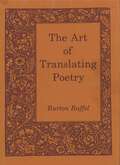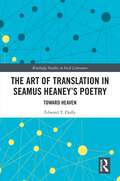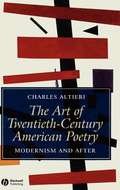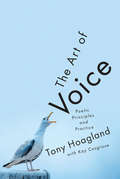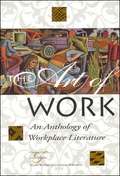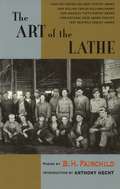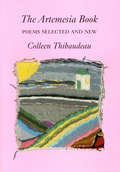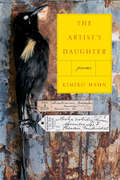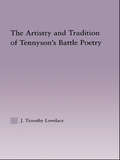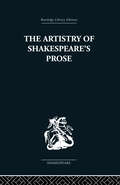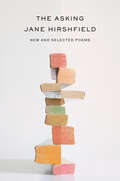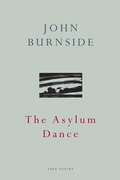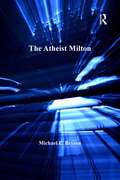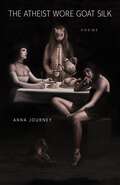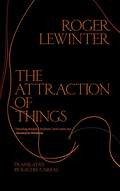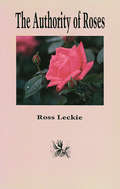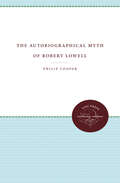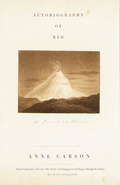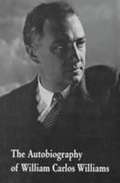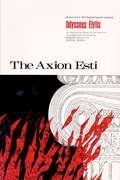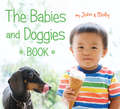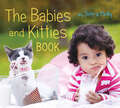- Table View
- List View
The Art of Translating Poetry
by Burton RaffelThis book by a well-known translator and critic is divided into two parts, the first dealing with the linguistic and other more technical aspects of translating poetry, the second involved with more practice-oriented matters. The chapters in Part One examine the specific constraints of language and the unavoidable linguistic bases of translation; the constraints of specific languages; forms and genres; and prosody and comparative prosody. Part Two looks at the subjective element in translation; collaborative translation; the translation of oral poetry; and the translator's responsibility.Languages discussed include Indonesian, Japanese, Chinese, Old and Middle English, French, German, Spanish, Italian, Persian, Russian, Latin, and Greek. The book argues, inter alia, that literal translation is impossible; that no translation can fully create the original but that good literary translation can create a usable approximation; that translation is secondary not only to the original work being translated but also to the linguistic (and literary) nature of the language being translated into; that the literary translator's primary responsibility is to the work he is translating; that there is nothing ever definitive about any translation; that the poetry translator must be a poet and poems should not be translated into prose; and that there must be a subjective identification between translator and translated work.This is the first attempt to systematize linguistic information about the translation of poetry. It is also the first book to range widely over the languages and literatures of the past and the present, and European and Asian languages and literatures as well. Raffel is the first author to combine in one study linguistic and scholarly knowledge and extensive experience of translation.
The Art of Translation in Seamus Heaney’s Poetry: Toward Heaven (Routledge Studies in Irish Literature)
by Edward T. DuffyThe Art of Translation in Seamus Heaney’s Poetry is a critical study of the poet's later work. While exploring his practice as a translator, it also traces his increasing preoccupation with the possibilities and conditions of translation in the theological sense of being lifted up in spirit. To the work of this philosophical poet, who would be both “earthed and heady” this book brings the insights of ordinary language philosophy as practiced by Stanley Cavell. It devotes separate chapters to Station Island and three later collections: Seeing Things, Electric Light and Human Chain. The first of these addresses the most fundamental change in Heaney’s life when he acknowledges the “need and chance to re-envisage” his Irish-Catholic upbringing; it is also replete with both the activity and the trope of translation. Published seven years later, Seeing Things begins with a translation of Virgil’s golden bough episode and ends with a similar crossing over into the underworld by Dante. Heaney transforms both into poems about poetry. In Electric Light, Heaney returns to Virgil, but now he concentrates not on the hero of the Aeneid but on Virgil's earlier efforts in pastoral, a mode of writing that Heaney takes as a model for his own time and place of “devastated order.” Heaney returns to the Aeneid in Human Chain, but this time around he gives all his attention to the scene of the human souls in Elysium seeking rebirth and turns it into an image for the need and chance of pronouncing “a final Yes” to our world and our place in it.
The Art of Twentieth-century American Poetry: Modernism and After
by Charles AltieriWritten by a leading critic, this invigorating introduction to modernist American poetry conveys the excitement that can be generated by a careful reading of modernist poems. Encourages readers to identify with the modernists' sense of the revolutionary possibilities of their art. Embraces four generations of modernist American poets up through to the 1980s. Gives readers a sense of the ambitions, the disillusionments and the continuities of modernist poetry. Includes close readings of particular poems which show how readers can use these works to connect with what concerns them.
The Art of Voice: Poetic Principles And Practice
by Tony HoaglandAn award-winning poet, teacher, and “champion of poetry” (New York Times) demystifies the elusive element of voice. In this accessible and distilled craft guide, acclaimed poet Tony Hoagland approaches poetry through the frame of poetic voice, that mysterious connective element that binds the speaker and reader together. A poem strong in the dimension of voice is an animate thing of shifting balances, tones, and temperatures, by turns confiding, vulgar, bossy, or cunning—but above all, alive. The twelve short chapters of The Art of Voice explore ways to create a distinctive poetic voice, including vernacular, authoritative statement, material imagination, speech register, tone-shifting, and using secondary voices as an enriching source of texture in the poem. A comprehensive appendix contains thirty stimulating models and exercises that will help poets cultivate their craft. Mining his personal experience as a poet and analyzing a wide range of examples from Catullus to Marie Howe, Hoagland provides a lively introduction to contemporary poetry and an invaluable guide for any practicing writer.
The Art of Work: An Anthology of Workplace Literature
by Christine LaroccoA collection of poetry, short stories, essays, and drama that provides the basis to complement the reading, writing, discussion, listening, and critical thinking skills necessary for any workplace-related curriculum.
The Art of the Lathe
by B. H. FairchildB.H. Fairchild's The Art of the Lathe is a collection of poems centering on the working-class world of the Midwest, the isolations of small-town life, and the possibilities and occasions of beauty and grace among the machine shops and oil fields of rural Kansas.
The Artemesia Book: Poems Selected and New
by Colleen ThibaudeauGranddaughters, asters, Medea cakes, para pom tandle, Mrs. Roker raking, Caraquet, angelic recurrence, Neruda, zupzupzup, the high bush cranberries, the Somme, a waterfall in Iceland that cries by the thousandsful, the Strawberry Shaman and the Japonica Bushelful Bountiful Lady: you would never mistake a Colleen Thibaudeau wordscape for any other. Her poems might have been written just after the imagination was invented. So lithe and playful, so naturally leaping even in elegy, they would seem like fabulous accidents if Colleen hadn't been making them, with no loss of freshness, for over forty years. There is a lifetime of poems in this book.
The Artist's Daughter: Poems
by Kimiko Hahn"Kimiko Hahn stands as a welcome voice of experimentation and passion."--Bloomsbury Review Kimiko Hahn's poetry explores the interplay--and tensions--among her various identities: mother, lover, wife, poet, and daughter of both the Midwest and Asia. However astonishing her subjects--from sideshow freaks to sadomasochistic fantasy--they ultimately emerge in this startling collection as moving images of the deepest levels of our shared humanity.
The Artistry and Tradition of Tennyson's Battle Poetry (Studies in Major Literary Authors #Vol. 28)
by Timothy J. LovelaceFirst Published in 2003. Routledge is an imprint of Taylor & Francis, an informa company.
The Artistry of Shakespeare's Prose
by Brian VickersFirst published in 1968. This re-issues the revised edition of 1979. The Artistry of Shakespeare's Prose is the first detailed study of the use of prose in the plays. It begins by defining the different dramatic and emotional functions which Shakespeare gave to prose and verse, and proceeds to analyse the recurrent stylistic devices used in his prose. The general and particular application of prose is then studied through all the plays, in roughly chronological order.
The Asking: New and Selected Poems
by Jane HirshfieldThe long-awaited new and selected collection by the author of &“some of the most important poetry in the world today&” (The New York Times Magazine), assaying the ranges of our shared and borrowed lives: our bonds of eros and responsibilities to the planet; the singing dictions and searchlight dimensions of perception; the willing plunge into an existence both perishing and beloved, dazzling &“even now, even here&”In an era of algorithm, assertion, silo, and induced distraction, Jane Hirshfield&’s poems bring a much-needed awakening response, actively countering narrowness. The Asking takes its title from the close of one of its thirty-one new poems: &“don&’t despair of this falling world, not yet / didn&’t it give you the asking.&” Interrogating language and life, pondering beauty amid bewilderment and transcendence amid transience, Hirshfield offers a signature investigation of the conditions, contradictions, uncertainties, and astonishments that shape our existence. A leading advocate for the biosphere and the alliance of science and imagination, she brings to both inner and outer quandaries an abiding compass: the choice to embrace what is, to face with courage, curiosity, and a sense of kinship whatever comes. In poems that consider the smallest ant and the vastness of time, hunger and bounty, physics, war, and love in myriad forms, this collection—drawing from nine previous books and five decades of writing—brings the insights and slant-lights that come to us only through poetry&’s arc, delve, and tact; through a vision both close and sweeping; through music-inflected thought and recombinant leap. With its quietly magnifying brushwork and numinous clarities, The Asking expands our awareness of both breakage&’s grief and the possibility for repair.
The Asylum Dance
by John BurnsideLucid, tender, and strangely troubling, the poems in The Asylum Dance - which won the Whitbread Prize for Poetry - are hymns to the tension between the sanctuary of home and the lure of escape. This is territory that Burnside has made his own: a domestic world threaded through with myth and longing, beyond which lies a no man's land - the 'somewhere in between' - of dusk or dawn, of mists or sudden light, where the epiphanies are.Using the framework of four long poems, 'Ports', 'Settlements', 'Fields' and 'Roads', the poet balances presence with absence; we are shown the homing instinct - felt in the blood and marrow - as a pull to refuge, simplicity, and a safe haven, while at the same time hearing the siren call from the world beyond: the thrilling expectancy of fairground or dancehall, the possibilities of the open road. With a confident open line and complete command of the language, John Burnside writes with grace, agility and profound philosophical purpose, confirming his position in the front rank of contemporary poetry.
The Atheist Milton
by Michael E. BrysonBasing his contention on two different lines of argument, Michael Bryson posits that John Milton-possibly the most famous 'Christian' poet in English literary history-was, in fact, an atheist. First, based on his association with Arian ideas (denial of the doctrine of the Trinity), his argument for the de Deo theory of creation (which puts him in line with the materialism of Spinoza and Hobbes), and his Mortalist argument that the human soul dies with the human body, Bryson argues that Milton was an atheist by the commonly used definitions of the period. And second, as the poet who takes a reader from the presence of an imperious, monarchical God in Paradise Lost, to the internal-almost Gnostic-conception of God in Paradise Regained, to the absence of any God whatsoever in Samson Agonistes, Milton moves from a theist (with God) to something much more recognizable as a modern atheist position (without God) in his poetry. Among the author's goals in The Atheist Milton is to account for tensions over the idea of God which, in Bryson's view, go all the way back to Milton's earliest poetry. In this study, he argues such tensions are central to Milton's poetry-and to any attempt to understand that poetry on its own terms.
The Atheist Wore Goat Silk: Poems
by Anna JourneyIn her third collection of poems, The Atheist Wore Goat Silk, Anna Journey once again celebrates the profusion of sensuality erupting from the material world. As she weaves dark fables, luminous family memories, and hard-edged personal tales into a singular fabric, Journey charts the boundaries of absence and departure, delineating the separations that we often hope to stitch back together at the intersections of the body and the imagination.Rhythmically charged and lyrically narrative, these poems are rich with verbal cascades and currents of mordant reflections. Throughout this collection, both readers and the poet are linked by a delicate and elegantly spun web of verse.
The Attraction of Things
by Roger Lewinter Rachel CareauStunning fragments that offer an epiphany of grace and beauty The Attraction of Things concerns the entirety of beauty and the possibility of grace, relayed via obsessions with rare early gramophone records, the theater, translation, dying parents: all these elements are relayed in a dizzying strange traffic of cultural artifacts, friendships, losses, discoveries, and love. Roger Lewinter believes that in the realm of art, "the distinction between life and death loses its relevance, the one taking place in the other." Whereas Story of Love in Solitude is a group of small stories, The Attraction of Things is a continuous narrative (more or less) of a man seeking (or stumbling upon) enlightenment. "The Attraction of Things," states Lewinter, "is the story of a being who lets himself go toward what attracts him, toward what he attracts--beings, works, things--and who, through successive encounters, finds the way out of the labyrinth, to the heart, where the bolt of illumination strikes. This is the story of a letting go toward the illumination."
The Aurorean, Volume XV, Issue 1, Spring/Summer 2010
by Cynthia Brackett-VincentThe poems play off the invisible web that connects all to the universe. There is a strong but quiet woven whisper between nature, humanity, the cosmos and time in this meditative and thoughtful book.
The Authority of Roses
by Ross LeckieNo postmodern gimmickry, no tricks except all the old ones that every good poet must learn: these lucid, evocative poems put the reader so clearly in the picture that you taste the blackberries of your childhood, shiver at the chill of rainwater down your neck in a western forest, or rake the dust from your hair as you trudge home from the Trojan War. Ross Leckie can capture the fleeting moments when we fully enter the world and believe we belong. At this low point in our country's cultural history, when more and more writers have become topical "content providers" for the ever-gaping maw of the society of the spectacle, those few artists like Ross Leckie who carefully craft their work within the poetic tradition, and who show respect for all the needs -- aural, esthetic, and intellectual -- of the most discerning readers, are more than ever to be valued.
The Autobiographical Myth of Robert Lowell
by Philip CooperLowell's continuing productivity and his ever-increasing stature as a poet demand a new evaluation of his work, and Cooper has provided it in this penetrating study. Though Cooper's primary purpose is to demonstrate the principle of the interrelation of the poems, a secondary and equally important purpose is to analyze the significance of Lowell's most recent work.Originally published in 1970.A UNC Press Enduring Edition -- UNC Press Enduring Editions use the latest in digital technology to make available again books from our distinguished backlist that were previously out of print. These editions are published unaltered from the original, and are presented in affordable paperback formats, bringing readers both historical and cultural value.
The Autobiography of Red
by Anne CarsonA NEW YORK TIMES NOTABLE BOOK OF THE YEARNational book Critics Circle Award Finalist "Anne Carson is, for me, the most exciting poet writing in English today."--Michael Ondaatje"This book is amazing--I haven't discovered any writing in years so marvelously disturbing." --Alice Munro The award-winning poet Anne Carson reinvents a genre in Autobiography of Red, a stunning work that is both a novel and a poem, both an unconventional re-creation of an ancient Greek myth and a wholly original coming-of-age story set in the present.Geryon, a young boy who is also a winged red monster, reveals the volcanic terrain of his fragile, tormented soul in an autobiography he begins at the age of five. As he grows older, Geryon escapes his abusive brother and affectionate but ineffectual mother, finding solace behind the lens of his camera and in the arms of a young man named Herakles, a cavalier drifter who leaves him at the peak of infatuation. When Herakles reappears years later, Geryon confronts again the pain of his desire and embarks on a journey that will unleash his creative imagination to its fullest extent. By turns whimsical and haunting, erudite and accessible, richly layered and deceptively simple, Autobiography of Red is a profoundly moving portrait of an artist coming to terms with the fantastic accident of who he is."A profound love story . . . sensuous and funny, poignant, musical and tender."--The New York Times Book Review"A deeply odd and immensely engaging book. . . . [Carson] exposes with passionate force the mythic underlying the explosive everyday." --The Village Voice
The Autobiography of William Carlos Williams
by William Carlos WilliamsThis autobiographical account of the life of William Carlos Williams recounts the challenges of being a busy physician in the town of Rutherford, New Jersey as well as pursuing a literary career. One of the finest chapters in this autobiography tells how each of his two roles stimulated and supported the other.
The Awful Rowing Toward God
by Anne SextonSexton's eighth collection of poetry is entitled The Awful Rowing Toward God. The title came from her meeting with a Roman Catholic priest who, although unwilling to administer last rites, told her "God is in your typewriter." This gave the poet the desire and willpower to continue living and writing. The Awful Rowing Toward God and The Death Notebooks are among her final works and both centre on the theme of dying.
The Axion Esti
by Odysseus Elytis Edmund Keeley George Savidis Samuel HazoThe Axion Estiis probably the most widely read volume of verse to have appeared in Greece since World War II and remains a classic today. Those who follow the music of Greek composer Mikis Theodorakis have been especially drawn to Odysseus Elytis's work, his prose is widely considered a mirror to the revolutionary music of Theodorakis. The "autobiographical" elements are constantly colored by allusion to the history of Greece, thus, the poems express a contemporary consciousness fully resonant with those echoes of the past that have served most to shape the modern Greek experience.
The Bab Ballads
by W. S. GilbertThe Bab Ballads is a collection of light verses by W. S. Gilbert, illustrated with his own comic drawings. The book takes its title from Gilbert's childhood nickname. He later began to sign his illustrations "Bab".
The Babies and Doggies Book
by John Schindel Molly WoodwardWhen you stop and think about it, babies and doggies do many of the same things. They squirm, sniff, sit, and splash. They play ball and cuddle. Lots of things babies do, doggies do too! This book explores all of the similar actions shared by baby and baby's best friend. Illustrated with beautiful, full-color photographs featuring an array of dog breeds and a diverse cast of babies, The Babies and Doggies Book is a visual feast for infants, a fun read-aloud for parents, and treat for baby- and dog-lovers.
The Babies and Kitties Book
by John Schindel Molly WoodwardJam-packed with colorful photos of adorable kittens and sweet babies, this rhyming book celebrates all of the ways kids and cats are alike. A companion to The Babies and Doggies Book.
